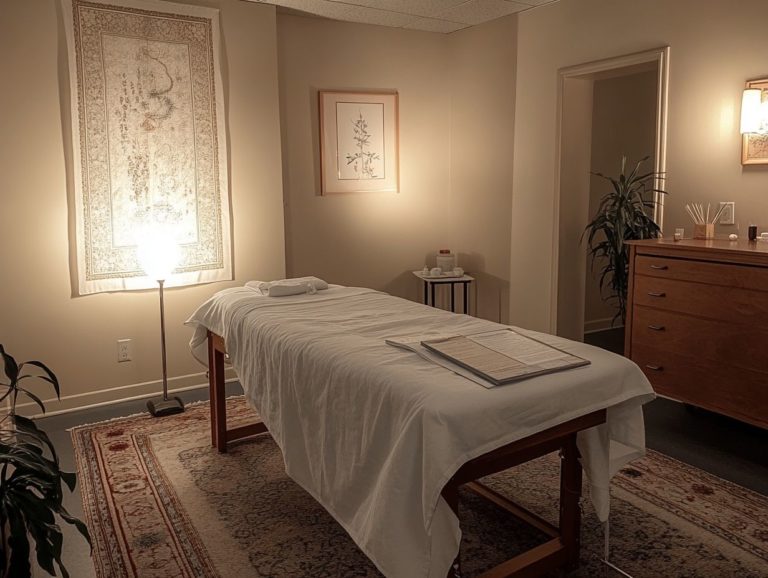How to Address Skepticism Around Alternative Medicine?
Alternative medicine often evokes a blend of intrigue and skepticism.
While many individuals are drawn to its holistic approach, others remain cautious about its effectiveness. This article clarifies what alternative medicine is, dispels common myths, and highlights research-backed benefits.
It also delves into strategies for effectively addressing skepticism and underscores the significance of integrating alternative practices with conventional medicine.
Whether you re a curious newcomer or a seasoned practitioner, deepening your understanding of this field can greatly enrich your health journey.
Contents
- Key Takeaways:
- Understanding Alternative Medicine
- Common Misconceptions
- Benefits of Alternative Medicine
- Addressing Skepticism
- Integrating Alternative Medicine with Conventional Medicine
- Frequently Asked Questions
- What is alternative medicine and why is it met with skepticism?
- How can I address skepticism towards alternative medicine from friends and family?
- What are some common misconceptions about alternative medicine?
- How can I evaluate the effectiveness of alternative medicine?
- How can I address my own skepticism towards alternative medicine?
- What role does cultural background play in skepticism towards alternative medicine?
Key Takeaways:

Alternative medicine includes practices like herbal remedies and acupuncture. Understanding and educating about these treatments can reduce skepticism. Combining alternative and conventional medicines can boost health outcomes.
Understanding Alternative Medicine
Understanding alternative medicine demands a careful understanding that takes into account diverse health care settings, the role of medical professionals, and the changing dynamics of patient relationships.
With the lines between conventional medicine and additional treatments used alongside traditional medicine increasingly blending, it s essential to explore how medical skepticism influences public trust and the way health information is shared.
Organizations like the World Health Organization show that communities such as Black Americans and the LGBTQ community face serious health issues. This situation calls for a deeper comprehension of alternative medicine to effectively address a range of health needs.
Defining Alternative Medicine
Alternative medicine encompasses a diverse array of practices and therapies that exist outside the realm of conventional medicine. This includes various additional treatments that medical practitioners utilize to enhance patient care.
These modalities think acupuncture, herbal medicine, chiropractic care, and yoga are all designed to promote holistic healing. Unlike conventional medicine, which often zeroes in on treating symptoms and managing diseases through pharmacological interventions, alternative medicine places a stronger emphasis on overall wellness and prevention.
This distinction fosters significant discussions within the medical community. Some healthcare providers may express skepticism regarding the scientific validity of alternative approaches, while others advocate for an integrative strategy that seamlessly blends traditional and alternative therapies.
Patients often turn to their doctors for guidance on these therapies, as medical professionals play a crucial role in educating and recommending safe, evidence-based options tailored to their unique health needs.
Common Misconceptions
Common misconceptions about alternative medicine frequently arise from misinformation circulating through various channels, contributing to heightened medical skepticism and, in some cases, vaccine hesitancy within the public.
Such misunderstandings can have a profound impact on trust in healthcare providers, ultimately influencing overall health literacy.
It s crucial to clear up these misunderstandings to build trust in healthcare and improve health literacy.
Debunking Myths and Misinformation

Debunking myths and misinformation about alternative medicine is crucial for ensuring you receive accurate medical advice. This is especially important while navigating the emotional biases that may shape your healthcare decisions.
You might find yourself drawn to the tempting promises of quick fixes offered by certain alternative treatments. Often, you may overlook the well-established benefits of evidence-based medicine.
For example, there’s a common belief that herbal remedies are universally safe and effective. This can lead to serious oversights regarding potential interactions with prescribed medications.
This kind of misinformation can result in risky health choices that compromise both the quality of care and the trust you place in healthcare professionals. By encouraging open discussions in healthcare settings, professionals can effectively tackle these myths and foster a supportive atmosphere.
When you clearly understand the true efficacy of treatments and the emotional drivers behind your choices, you can cultivate a stronger, trust-based relationship with your providers. This partnership ultimately enhances your overall health results.
Benefits of Alternative Medicine
Discover the amazing benefits of alternative medicine it can transform your health! The advantages are truly multifaceted, offering you improved medical outcomes and fostering deeper patient relationships.
This thoughtful integration not only addresses differences in health access and outcomes but also enhances overall patient satisfaction. It gives you the power to make more informed decisions about your health.
Evidence and Research Supporting Alternative Medicine
The evidence and research backing alternative medicine have surged dramatically as scientists conduct many studies. These studies aim to validate the effectiveness of various complementary therapies.
For example, esteemed institutions like the National Center for Complementary and Integrative Health have published findings that reveal how therapies such as acupuncture and mindfulness-based stress reduction can significantly enhance the quality of life for patients undergoing conventional medical treatments.
These alternative approaches not only alleviate symptoms and boost mental well-being but also exhibit a synergistic effect when integrated with standard medical care.
This expanding body of evidence suggests that by embracing the potential of holistic solutions, healthcare providers can deliver a more comprehensive and patient-centered approach to healing. This enriches traditional methods with valuable insights from alternative practices.
Addressing Skepticism
Addressing medical skepticism is crucial for building trust between you and your healthcare providers. This can be achieved through tailored communication strategies that cater to your unique needs.
By recognizing the emotional responses that fuel skepticism, practitioners can strengthen their relationships with you. This ultimately enhances health outcomes.
Effective Communication Strategies

Effective communication strategies are essential for building trust and fostering strong relationships with patients. This is especially important when addressing the emotional biases that can influence how health information is perceived.
By employing various communication frameworks, you can skillfully navigate the complex emotions that often arise during medical consultations. Techniques like active listening and empathetic responses enable you to validate patient concerns, which helps reduce skepticism and enhances overall understanding.
Using clear, jargon-free language bridges the gap between your medical expertise and the patient s comprehension. This shift toward a more collaborative dialogue not only gives patients the power but also creates opportunities to discuss their emotional responses.
Ultimately, this approach leads to better health results and increased satisfaction with the care provided.
Integrating Alternative Medicine with Conventional Medicine
Integrating alternative medicine with conventional medicine embodies a holistic approach to medical care. This enables you to access comprehensive treatment plans tailored to your unique needs and preferences.
This thoughtful integration not only addresses differences in health access and outcomes but also enhances overall patient satisfaction.
Don t wait explore how integrating these approaches can elevate your health today!
The Importance of Collaboration
Collaboration among healthcare providers is very important. It enhances the application of non-mainstream treatments that work alongside regular medicine for better outcomes.
By creating a synergistic environment, you can enable various specialists physicians, nurses, and alternative medicine practitioners to exchange insights. This leads to diverse therapeutic approaches tailored specifically to each individual’s needs.
This teamwork also nurtures a holistic perspective on healthcare. It gives you the power to explore a range of treatment options that resonate with your unique circumstances.
When both traditional and alternative methods are harmonized, the combined expertise can lead to enhanced health outcomes. It also improves the management of chronic conditions, ultimately establishing a comprehensive care model that prioritizes your well-being.
Frequently Asked Questions
What is alternative medicine and why is it met with skepticism?

Alternative medicine is a broad term that encompasses a variety of non-traditional medical practices and treatments. These practices often differ from conventional medicine and may not have a scientific basis, leading to skepticism from some individuals.
How can I address skepticism towards alternative medicine from friends and family?
Start by educating yourself on the specific alternative medicine practices you are interested in. This will allow you to have informed discussions with your loved ones and address any concerns they may have.
It’s also important to keep an open mind and listen to their perspective.
What are some common misconceptions about alternative medicine?
One common misconception is that alternative medicine is a replacement for conventional medicine. In reality, it should be used as a complementary approach to conventional treatments.
Another misconception is that all alternative medicine practices are entirely natural, when in fact some may involve synthetic components.
How can I evaluate the effectiveness of alternative medicine?
It’s important to research the alternative medicine practice thoroughly, including its potential benefits and risks. Look for reliable sources such as reputable medical journals and consult with a healthcare professional.
You can also seek out personal experiences and testimonials from individuals who have tried the practice.
How can I address my own skepticism towards alternative medicine?
If you are skeptical about alternative medicine, it’s important to keep an open mind and be willing to learn more about the practice. Start by talking to individuals who have had positive experiences and check out this resource on how to approach alternative treatments safely, and do your own research.
It’s also helpful to consult with a healthcare professional to get their perspective.
What role does cultural background play in skepticism towards alternative medicine?
Cultural background can greatly influence one’s beliefs and values, including their attitudes towards alternative medicine. It’s important to respect and understand these differences.
Having open and respectful discussions about alternative medicine with individuals from different cultural backgrounds can foster better understanding.






